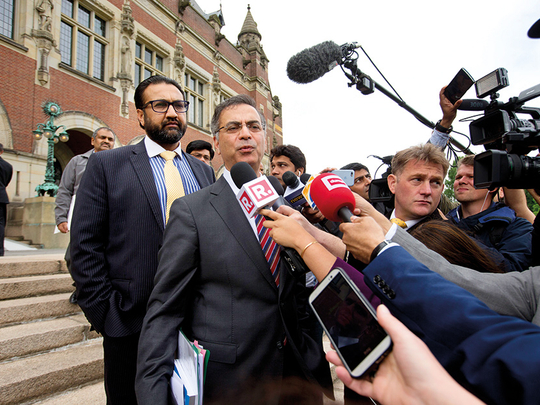
Islamabad: The next proceedings of the Jadhav case at international court will be very crucial for Pakistan, cautioned Ahmer Bilal Soofi, an international law expert, after the International Court of Justice (ICJ) initial ruling to stay the death sentence awarded to Indian spy Kulbhushan Jadhav by Pakistan.
“The Court has given the stay order effectively and has not issued a date for the next hearing, which indicates the ICJ will take some time, perhaps months, to decide the case,” Soofi said. “This time must be utilised skilfully by Pakistan to strengthen its legal arguments to satisfy the Court.”
Since the court rejected Pakistan’s contention that the Pakistan-India Consular Access agreement 2008 took precedence over the provisions in the Vienna Convention, “Pakistan should now focus on all the identified issues to satisfy the top court in future hearings,” Soofi suggested.
Khawar Qureshi led Pakistan’s arguments at The Hagu on May 15, after India’s appeal. He argued the court had no jurisdiction to hear such a case, according to the Vienna Convention.
On Thursday, the court overruled Pakistan’s plea and said it would hear the case and seek arguments from both sides.
ICJ has no jurisdiction over Pakistan’s national security matters: Foreign Office
Reacting to the ICJ verdict, Foreign Office spokesperson Nafees Zakaria says: “We do not accept the jurisdiction of the ICJ in matters related to the national security of the country.”
Talking to state media, PTV, Zakaria said India has been trying to hide its real face by taking the case of Kulbhushan Jadhav to the ICJ.
“Indian spy [Jadhav] confessed his crimes of sabotage, terrorism and subversion not only once but twice,” he said. “Pakistan will present solid evidence against the Indian spy in the International Court.”
Pakistani lawyers did not present case well — local lawyers
Retired Justice Shaiq Usmani, a law expert, said the ICJ decision was upsetting as Pakistan claimed the court has no jurisdiction in the matter.
“Pakistan’s main focus on jurisdiction of ICJ in the case was a technical fault.”
He suggested that Pakistani lawyers should now prepare for proceedings, as the Court has asked for further evidence.
Pakistan was not well-prepared and did not utilise the 90 minutes it had to make its argument, said London-based Barrister Rashid Aslam.
He also added that: “It is very clear, [under] Article 5B of the Vienna Convention, that if a civilian is caught he is subject to human rights law. But if it is a spy, then human rights are forfeited. So I don’t think we presented the case quite well.”
Barrister Dr Farogh Nasim said Pakistan should not have conceded to ICJ’s jurisdiction. “India did not give consent to the Kashmir issue going to ICJ, then why did Pakistan give consent to the Jadhav case?,” he said.
Pakistan, however, is still positive about the outcome of the case.
The current ruling is very basic process, said Pakistan’s ambassador to the ICJ, Moazzam Ahmad Khan. “The court ... has said nothing on the merits or the maintainability of the case.”
Pakistan was not prepared for the case — politicians
Despite having strong evidence against Jadhav, Pakistan did not present its case vigorously at the UN’s top court, some Pakistani politicians have said.
“Pakistan had a solid case with strong evidence against Jadhav being involved in espionage and terrorism, but we lost the opportunity to present it robustly which is why the verdict is not in our support,” said Shah Mahmood Quraishi, vice-chairman of the Pakistan Tehreek-i-Insaf opposition party.
“Pakistani lawyers must defend the case supported by all evidence, because the fact of the matter is Jadhav is an Indian spy caught red-handed in Pakistan,” he added.
Senior PPP leader, Senator Sherry Rahman, said, “India is utilising [all its] options, including lobbying, to win the case. Similarly, Pakistan should employ all resources to make its position strong and lobby international support in the Jadhav issue.”
Highlighting the complacency of Pakistan’s team at ICJ, she asked: “Why did Pakistan complete its presentation (at ICJ hearing) in less than 50 minutes, while India took it complete time of 90 minutes.”
Veteran Pakistani politician, Shireen Mazari, noted in her tweet: “We went [to ICJ] unprepared deliberately. How else would a lawyer not explain the appeals process . We did not explain our appeal and review system to show there was no urgency,” which is why Pakistan lost on legal grounds.
Political, security experts weigh in
Political expert Zafar Hilaly said “Pakistan should allow India access to Jadhav respecting the verdict of ICJ, but Pakistan must not free this man who has been involved in terrorism, killed innocent Pakistanis.”
Retd. Lt Gen Talat Masoud, a security and political expert, said, “The ICJ has only denied Pakistan’s argument on the matter of jurisdiction which does not mean Pakistan has lost the case.”
He said the sole purpose of India, in taking the Jadhav case to the international court, was to pressurise Pakistan globally, to which the country should not bow.
Some Pakistani commentators also said the ICJ ruling could aggravate already tense relations between Pakistan and India.
Others said the verdict might encourage terrorists in Pakistan who would feel they have a right to appeal their sentences, even after being charged and convicted.












